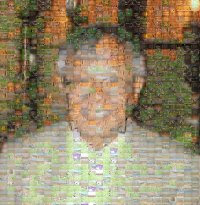
Chongqing area map, the center of Chongqing is the pink area.
I was born in Gouloshan (歌乐山). (See the bottom one of the three circled spots on the left side of the map, it is in large black characters). It means Song-Happy Mountain. I do not know if this has anything to do with my love-of-music character or not, but it sounded natural. The 24-hour bombing started in 1940. Our family moved more away from the center of Chongqing and Dean was born in Chingmookuan(青木关), north from Gouloshan。It means Green-Wood-Gate. By that time, food became scarce, and mother did not have enough milk for Dean. All her life, she was partly apologetic and partly cursing the Japanese because Dean had to drink boiling rice instead of her milk, which caused Dean to be small and unhealthy. Two years later we moved again, this time to Beipei (北培), the top cycled town on map, where our sister Huang Tao-pei was born. (This sister later died in Taiwan). She was nick-named “Peipei” after the town’s name. My mother liked to use double words in a name to express intimacy. For example, when Dean’s daughter, Deana, was born she was called Shin-shin, the happy one. And our daughter Margaret was nick-named Pan-pan, the long expected one.
When the war was over in 1945, we moved to Nanking! There were five moves in six years for my parents, which was very common for the lucky couples (they survived) during this eight-year turbulent Japanese war period.

My father was a family man, but was unfortunately unable to show his affection to his own children. Perhaps he felt that he needed to show authority so that his children would grow up straight and decent. I was able to feel his love being a daughter and being the youngest. Still his feeling was rather reserved even toward me. But Mother told a story which vividly described Father's emotions and his love for his family. When Japanese was bombing the city regularly, Father would hide in a cave nearby his office. Mother would take the children to hide always in this big cave near home. That one time, the big cave was too full, Mother had to use another cave farther from the home. After the planes left, Mother came out with the children from hiding and tried to rush home. It was already turning dark, she saw Father walking mindlessly on the street, pale faced with tears running down his face. Father heard that all people hid in the big cave suffocated to death, and he thought that his wife and kids were all dead. I always have this picture in my mind when my Mom and Dad stared at each other on that particular evening in history. What did they say to each other? What did go through their minds and hearts? They probably just went home in silence, and hurried up to feed their hungry kids.
ReplyDelete